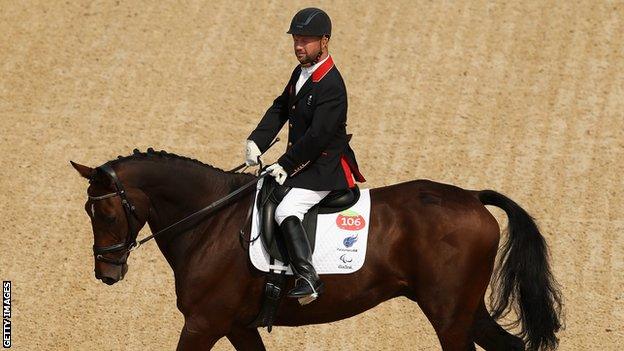Para-equestrian at Tokyo Paralympics: All you need to know
- Published

Lee Pearson is Britain's most successful competitor in the sport
Paralympic Games on the BBC |
|---|
Venue: Tokyo, Japan Dates: 24 August-5 September Time in Tokyo: BST +8 |
Coverage: Follow on Radio 5 Live and on the BBC Sport website |
Key information
Dates: 26-30 August
Venue: Equestrian Park
Gold medals on offer: 11
How does it work?
Para-equestrian events at the Paralympics consist solely of dressage competition, with riders divided into five grades - grade I for the most-impaired riders up to grade V for the least impaired.
Men and women compete against each other equally within their specific grades, with riders taking part on their own horses. The level of difficulty of the test they perform is relative to their allocated grade.
Riders may use permitted assistive devices while visually impaired riders are permitted to use 'callers' to help them navigate around the arena.
Grade I, II and III ride in the smaller dressage area while grade IV and V ride in a larger one.
All riders compete in three dressage tests: a team test and an individual championship test, both with a set series of movements, and a freestyle test (where athletes choose their own routine and set it to their own choice of music).
A country can enter a maximum of four riders. Three riders take part in the team event while a fourth rider competes as an individual.
The results of the team and individual championship tests are added together to arrive at the overall team score. Individual medals are also awarded in both the individual championship test and the freestyle test.
All riders, whether competing in a team or not, may ride in the team test.
Who are the British medal hopes?
GB topped the medal table at the 2016 Games in Rio and three of the four-strong Tokyo team - Lee Pearson, Natasha Baker and Sophie Wells - have multiple Paralympic titles to their name. Pearson will be hoping to win his 12th gold which would see him move above Baroness Tanni Grey-Thompson and Dave Roberts in the all-time GB medal table. The team is completed by Georgia Wilson who came in as a late replacement for Sophie Christiansen. Wilson is making her Games debut but is a European gold and silver medallist.
Who are the other medal challengers?
While GB have dominated the sport for many years, other nations are catching up fast. The Netherlands ended their unbeaten record in the team event, which stretched back to 1996, at the 2018 World Equestrian Games and also won the 2019 Europeans, while Germany and the US are also strong.
Did you know?
American rider Beatrice De Lavalette was 17 when she was seriously injured in a terrorist bombing at Brussels Airport in March 2016. She needed to have both lower legs amputated and also suffered internal injuries, burns and a spinal cord injury. A rider from the age of three, she was back on her horse five months after the attack and will be making her Paralympic debut in Tokyo.
ParalympicsGB Rio 2016 medals
11 (team gold - Sophie Christiansen, Natasha Baker, Anne Dunham & Sophie Wells; individual gold - Christiansen (two), Baker (two), Wells, Pearson; individual silver - Dunham (two), Pearson, Wells.